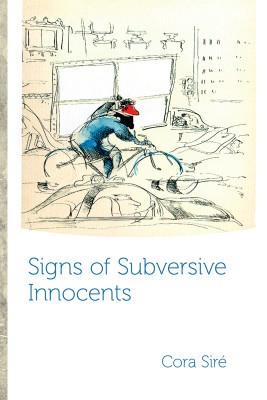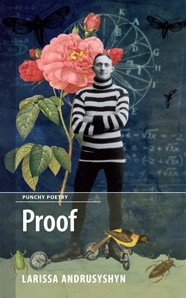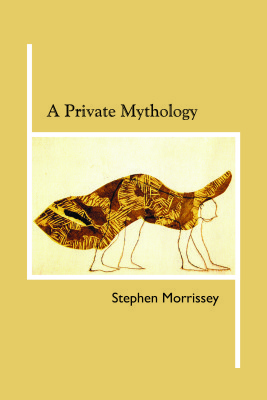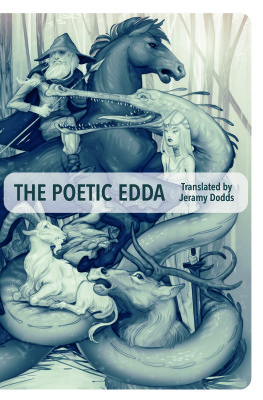Cora Siré’s outstanding debut has material for several books. Her subjects include travel, exile, geology, works of art, and Latin American history. The travel poems are not quick tourist snapshots: she has an impressive knowledge of Vietnam, and her poems about Argentina’s sad history have tragic depth. The personal themes – diasporic dislocation, the struggles of love – are as piercing as the quena, the Andean flute that she writes about in a poem of brilliant metaphoric phrases, the equivalents of musical notes.

Signs of Subversive Innocents
Cora Siré
Signature Editions
$14.95
paper
84pp
978-1927426-38-8
Larissa Andrusyshyn’s first collection, Mammoth, explored grief by making fine use of imagery drawn from DNA and paleontology. In Proof, she extends her range of metaphors to include mathematics and entomology. Mathematics lets her create unsentimental poems about a potentially sentimental subject, known in creative writing workshops as “the break-up poem,” a dangerous subcategory of “the relationship poem.” She is served well by her knowledge of commutative qualities and the work of Euler and Fermat. Think of Andrew Marvell’s use of plane and solid geometry in “The Definition of Love,” published in 1681, with its planispheres and parallel lines. Is Andrusyshyn our modern metaphysical poet?

Proof
Larissa Andrusyshyn
Livres DC Books
$17.95
paper
68pp
978-1-927599-30-3
Mary di Michele’s The Montreal Book of the Dead shows how well a chapbook works when it has a theme. Most of the ten poems in this pamphlet are about people who are either literally dead or suffering from failing memory. Nearly all of the poems are written in stanzas, usually quatrains or tercets, but she also writes a glosa and an unrhymed sonnet. Her syntax is precise and well suited to these meditations on death, aging, and memory. Some of the poems are elegies for her parents, but another theme is dementia, a shadow of death. She doesn’t hesitate to generalize, offering a gentle wisdom: in “Forgetfulness” she observes that remembering is hard for the old, but forgetting is difficult for the young. In “Scotopia” (the term for seeing in dim light), she takes us to the top of Mount Royal at night, and then delivers an epiphany, a vision of the world from the stellar perspective, seeing it as a whole: “we all bow to the darkness, / we all turn in the light.” In faint light, illumination is born. As Wittgenstein said, “the feeling for the world as a limited whole—that is the mystical.”
The Montreal Book of the Dead
Mary di Michele
Vallum Chapbook Series No. 17
$10.00
paper
20pp
978-0-9879199-5
The best poetry in Stephen Morrissey’s A Private Mythology is found in the sequences. His 2012 chapbook, The Coat Poems, is included in the first section of the new work. He makes some amusing and often moving variations on the garment: “The Homeless Man’s Coat,” “The Poet’s Coat,” and “The Shaman’s Coat,” to name a few. The garments become metaphors for themes like love, poverty, the self, and the writing of poetry. Hints of childhood in a dysfunctional family in “Mother’s Mink Coat” are elaborated in several later poems.

A Private Mythology
Stephen Morrissey
Ekstasis Editions
$23.95
paper
89pp
978-1-77171-055-8
The autobiographical works in the book’s last section mix love poetry, discussions of the poet’s calling, and family stories. Most of the love poems have only their sincerity to recommend them, and the remaining poems often fail to make his private mythology (his family history) interesting enough to others. The most memorable lines of the book are in “Waking at 4 a.m.” Morrissey tells us that “this is when the poem / of morning is created; / we are workers in the darkness, / early risers, busy with / the enterprise of light.”
The Poetic Edda, also known as The Elder Edda, is an Icelandic compilation of Norse myths and narratives dated around AD 1000. The texts convey a pre-Christian world that is often startling in its violence and its rather incoherent mythology. The Icelandic sagas written centuries later are better known and easier to find. The Edda is a distillation of a culture: its religion, its legends, and its wisdom. The best-known presentation of the Edda for common readers is a fairly short selection prepared by a poet, W. H. Auden, and a scholar, Paul B. Taylor, published in 1970. Jeramy Dodds is a poet and a scholar both. He describes his work as a re-enactment of the written texts, taking whatever liberties seemed necessary to produce a readable English version. He works at keeping the terse lines and the all-important alliterative patterns of the originals. Auden and Taylor are sometimes a little stuffy, almost archaic, but Dodds is always direct and not likely to sound dated a generation from now.

The Poetic Edda
Translated by Jeramy Dodds
Coach House Books
$23.95
paper
280pp
978-1-55245-296-7






0 Comments